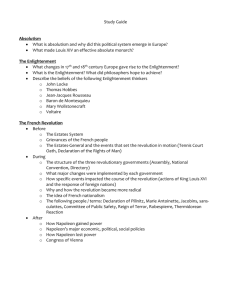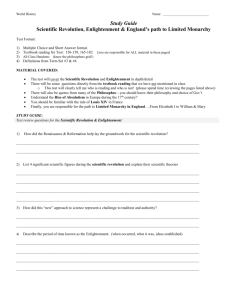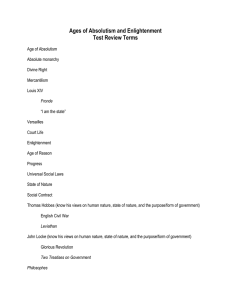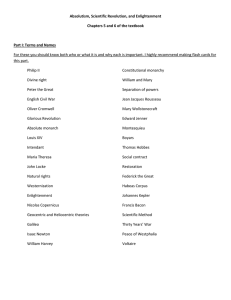Document 17621039
advertisement
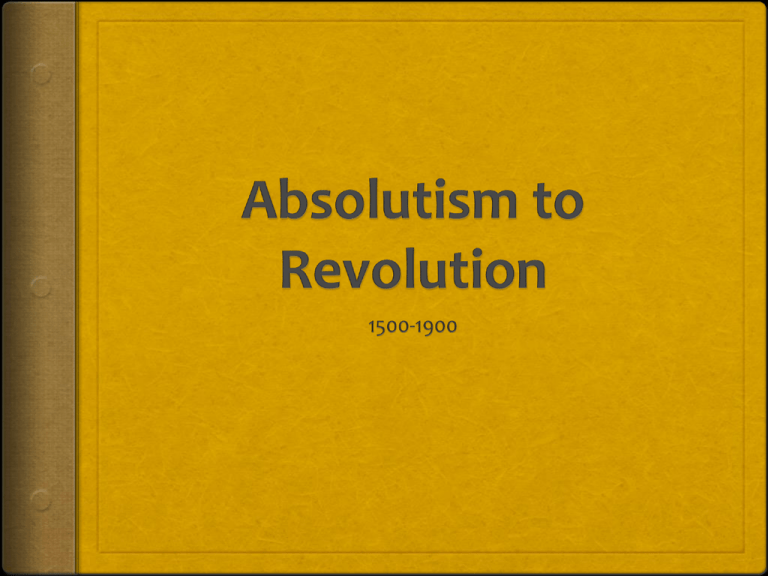
Absolutism The political belief that one ruler should hold all of the power within the boundaries of a country Absolutism Absolute Monarchs- kings or queens who held all of the power within their states’ boundaries Goal: control every aspect of society Absolutism Divine Right- idea that God created the monarchy and that the monarch acted as God’s representative on Earth What causes absolutism? Long-term Causes Decline of feudalism Rise of cities and support of middle class Growth of national kingdoms Loss of Church authority What causes absolutism? Immediate Causes Religious and territorial conflicts Buildup of armies Need for increased taxes Revolts by peasants or nobles What are the effects of absolutism? Immediate Effects Regulation of religion and society Larger courts Huge building projects New government bureaucracies appointed by the government Loss of power by nobility and legislatures What are the effects of absolutism? Long-term Effects Revolution in France Western European influence in Russia English political reforms that influence U.S. democracy European Absolute Monarchs Philip II (Spain)- Defender of Catholicism Louis XIV (France)- “The Sun King,” lived a lavish lifestyle Ivan the Terrible (Russia)- Added lands to Russia and a code of law, but later became brutal Peter the Great- Goal of westernization Limits on the Monarchy Event 1: English Civil War (1642-1649) What: Royalists/Cavaliers (loyal to the king) versus Roundheads (Puritan supporters of parliament) for control Limits on the Monarchy Importance: First time a monarch is brought to trial for treason, executed Oliver Cromwell (Puritan general) took power and establishes a commonwealth (republican form of government) Limits on the Monarchy Event 2: Restoration (1660- 1685 or 1688) What: The English, Scottish, and Irish monarchies are restored under Charles II after Cromwell’s death Limits on the Monarchy Importance: Parliament passes habeas corpus, the right for every prisoner to be brought before a judge to hear the charges against him Limits on the Monarchy Event 3: The Glorious Revolution (1688) What: Bloodless overthrow of King James II, a Catholic, by Protestant Parliament Limits on the Monarchy Importance: William of Orange, and his wife, Mary, Protestant daughter of James, asked to rule England William and Mary work with Parliament to create a Constitutional Monarchy- laws limit monarch’s power Scientific Revolution A new way of thinking about the world develops, based on observation, and a willingness to question assumptions Scientific Revolution Old science- reliance on ancient authorities, church teachings, common sense to explain the physical world Scientific Revolution New science- observation, experimentation, and scientific reasoning to gather knowledge and make conclusions about the physical world Scientific Revolution Ideas Heliocentric theory challenges geocentric theory Mathematics and observation Scientific method Enlightenment Challenges many accepted ideas about government and society Enlightenment Old idea of government- monarch’s rule is justified by divine right Enlightenment New idea of governmentgovernment’s power comes from the consent of the governed Enlightenment Thinker: Locke Idea Natural rights- life, liberty, property Impact Fundamental to U.S. Declaration of Independence Enlightenment Thinker: Montesquieu Idea Separation of powers Impact France, U.S., and Latin American nations constitutions Enlightenment Thinker: Beccaria Idea Abolishment of torture Impact Guaranteed in U.S. Bill of Rights Outlawed or reduced in nations of Europe and Latin America Enlightenment Thinker: Voltaire Idea Freedom of thought and expression Religious Freedom Impact Guaranteed in U.S. Bill of Rights and French Declaration of the Rights of Man and Citizen European monarchs reduce or eliminate censorship and religious persecution Enlightenment Thinker: Wollstonecraft Idea Women’s equality Impact Women’s rights groups form in Europe and North America Spread of Ideas Enlightenment ideas appeal to thinkers and artists across Europe Salons help spread Enlightenment thinking Spread of Ideas Ideas spread to literate middle class Enlightened Despots attempt reforms Ideas sweep through European society and to colonial America American Revolution Enlightenment ideas influence colonists Britain taxes colonists after French and Indian War American Revolution Colonists denounce taxation without representation War begins in Lexington and Concord Colonists declare independence, defeat Britain, and establish republic French Revolution Long-Term Causes Social and economic injustices of the Old Regime Enlightenment ideasliberty and equality Example provided by the American Revolution French Revolution Immediate Causes Economic crisisfamine and government debt Weak leadership Discontent of the Third Estate French Revolution- Events Symbol of revolution: Fall of the Bastille Creation of: the National Assembly French RevolutionDocuments Declaration of the Rights of Man and of the Citizen New constitution French RevolutionImmediate Effects Immediate Effects End of the Old Regime Execution of the monarch War with other European nations Reign of Terror Rise of Napoleon French RevolutionLong-Term Effects Long-Term Effects Conservative reaction Congress of Vienna Decline in French power Spread of Enlightenment ideas Growth of nationalism Revolutions in Latin America New Political Philosophies Conservative- argued for protecting the traditional monarchies of Europe Who: usually wealthy property owners and nobility New Political Philosophies Liberal- wanted to give more power to elected parliaments Mostly middle-class business leaders and merchants New Political Philosophies Radical- favored drastic change to extend democracy to all people Nationalism Belief that people’s greatest loyalty should be to a nation of people who share a common culture and history Nation-state- when a nation has it’s own independent government Positive Results of Nationalism People overcoming differences for the common good Overthrow of colonial rule Democratic governments in nations throughout the world Competition among nations spurring scientific and technological advances Negative Results of Nationalism Forced assimilation of minority cultures into a nation’s majority cultures Ethnic cleansing Rise of extreme nationalism movements Competition between nations leading to warfare Nationalist Movements in Latin America Haiti: Slave-led South America: Creole-led Brazil: Royalty-led
